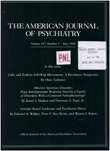Twenty-four-hour profiles of body temperature and plasma TSH in bipolar patients during depression and during remission and in normal control subjects
Abstract
The 24-hour patterns of body temperature and plasma thyrotropin (TSH) were measured in eight bipolar patients in both depressed and recovered (after 3 weeks of treatment) states and in eight normal control subjects. Clear circadian patterns were detected for both temperature and TSH. Nocturnal body temperature was increased and the nocturnal surge of TSH was blunted during depression; these abnormalities were corrected after recovery. The inverse relationship between changes in body temperature and TSH levels at night suggests that changes in thermoregulation may be responsible for the neuroendocrine disturbance and may play a role in the pathophysiology of depression.
Access content
To read the fulltext, please use one of the options below to sign in or purchase access.- Personal login
- Institutional Login
- Sign in via OpenAthens
- Register for access
-
Please login/register if you wish to pair your device and check access availability.
Not a subscriber?
PsychiatryOnline subscription options offer access to the DSM-5 library, books, journals, CME, and patient resources. This all-in-one virtual library provides psychiatrists and mental health professionals with key resources for diagnosis, treatment, research, and professional development.
Need more help? PsychiatryOnline Customer Service may be reached by emailing [email protected] or by calling 800-368-5777 (in the U.S.) or 703-907-7322 (outside the U.S.).



